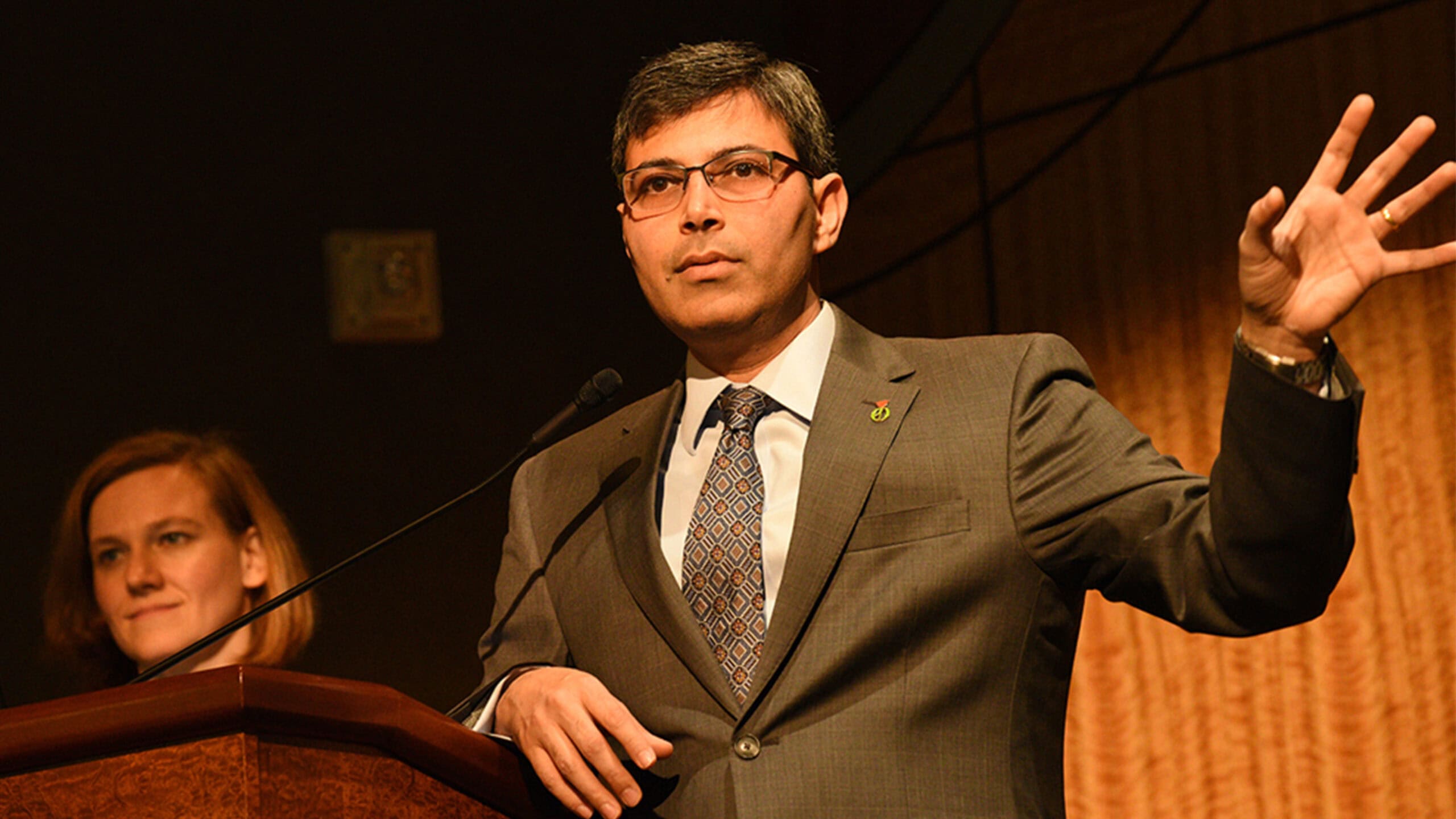Experts Share New Treatments, Solutions for Parkinson’s Patients, Caregivers
| New treatments for Parkinson’s disease, including drugs that researchers at the University of Arkansas for Medical Sciences (UAMS) have been working on for years, will finally become available in pharmacies this year, Rohit Dhall, M.D., predicted at the recent Ninth Annual Parkinson’s Symposium at UAMS.
Dhall, who is also the medical director of the UAMS Clinical Trials Innovation Unit, said most of the novel therapies are designed to help patients control motor symptoms although UAMS neurologists are continuing research trials to slow the progression of the disease.
Addressing live and virtual audiences from a stage at the UAMS Jackson T. Stephens Spine & Neurosciences Institute, he provided an update on a randomized clinical trial for which UAMS was a site, designed to test the effectiveness of the diabetes drug exenatide as a potential disease-modifying drug in Parkinson’s patients. Despite some initially positive signs, the trial did not show improved course of Parkinson’s disease after 48 weeks of receiving drug compared to those who received a placebo.
Dhall said preliminary human research into a drug called lixisenatide indicates that it may slow the progression of Parkinson’s, and he encouraged Parkinson’s patients to sign up for clinical trials, saying their participation is “critical” in making progress.
Dhall also discussed new drugs that were tested at UAMS and other centers internationally, aimed at counteracting the fluctuating effectiveness throughout the day of some Parkinson’s medications, while minimizing side effects like sleepiness.
“We’re hitting the sweet spot more consistently,” he said, indicating that improved drugs could come by the end of this year.
Hillary Williams, M.D., and Stephen Docherty, Psy.D., were among the UAMS physicians who, over the course of two hours, shared tips for recognizing and slowing the cognitive changes that accompany Parkinson’s disease, and emphasized the importance of exercise, diet, sleep and hydration in controlling symptoms.
The symposium was aimed at Parkinson’s patients, their caregivers, family members and health care professionals.
D. Micah Hester, Ph.D., chair of the UAMS Department of Medical Humanities and Bioethics, discussed the need for Parkinson’s patients to make arrangements before their disease becomes too advanced.
“Start having conversations with your health care providers, family members and friends,” he urged them.
He said the children of patients often struggle over deciding the best course of action to take when big decisions must be made.
“I need you to tell me as best as possible who will speak for you,” he said, directly addressing patients. “Who will speak your voice, not their own? You have to be willing to identify people who are willing to speak for you.”
Hester said patients shouldn’t worry that designating someone to make decisions for them will cause them to be unnecessarily controlled before they’re ready.
“You retain control as long as you are able,” he said.
Neurosurgeon Erika Petersen, M.D., founder of the symposium and director of functional and restorative neurosurgery at UAMS, used visual aids to explain how she performs deep brain stimulation surgery for Parkinson’s patients. She said that in 90% of the surgeries, the patient remains awake during part of the procedure so she can be sure that she is targeting the correct area of the brain with a spaghetti-thin electrode. Videos she played showed patients suddenly being able to write legibly or thread a fishhook when the electrode tapped a specific region of their brain.
But for those who fear brain surgery, she reassured them that “nobody is going to be hurried into brain surgery.” She said DBS “is not the only option” for reducing troubling Parkinson’s symptoms.
The symposium ended after a presentation by Sue Fehlberg, an Arkansan who is a certified Kon-Mari specialist. She demonstrated ways to reduce clutter at home to help Parkinson’s patients from being overwhelmed on top of their existing frustration. The former paramedic even demonstrated a way to fold socks, shirts and fitted sheets to store them neatly, which she said contributes to an overall, much-needed sense of calm.
